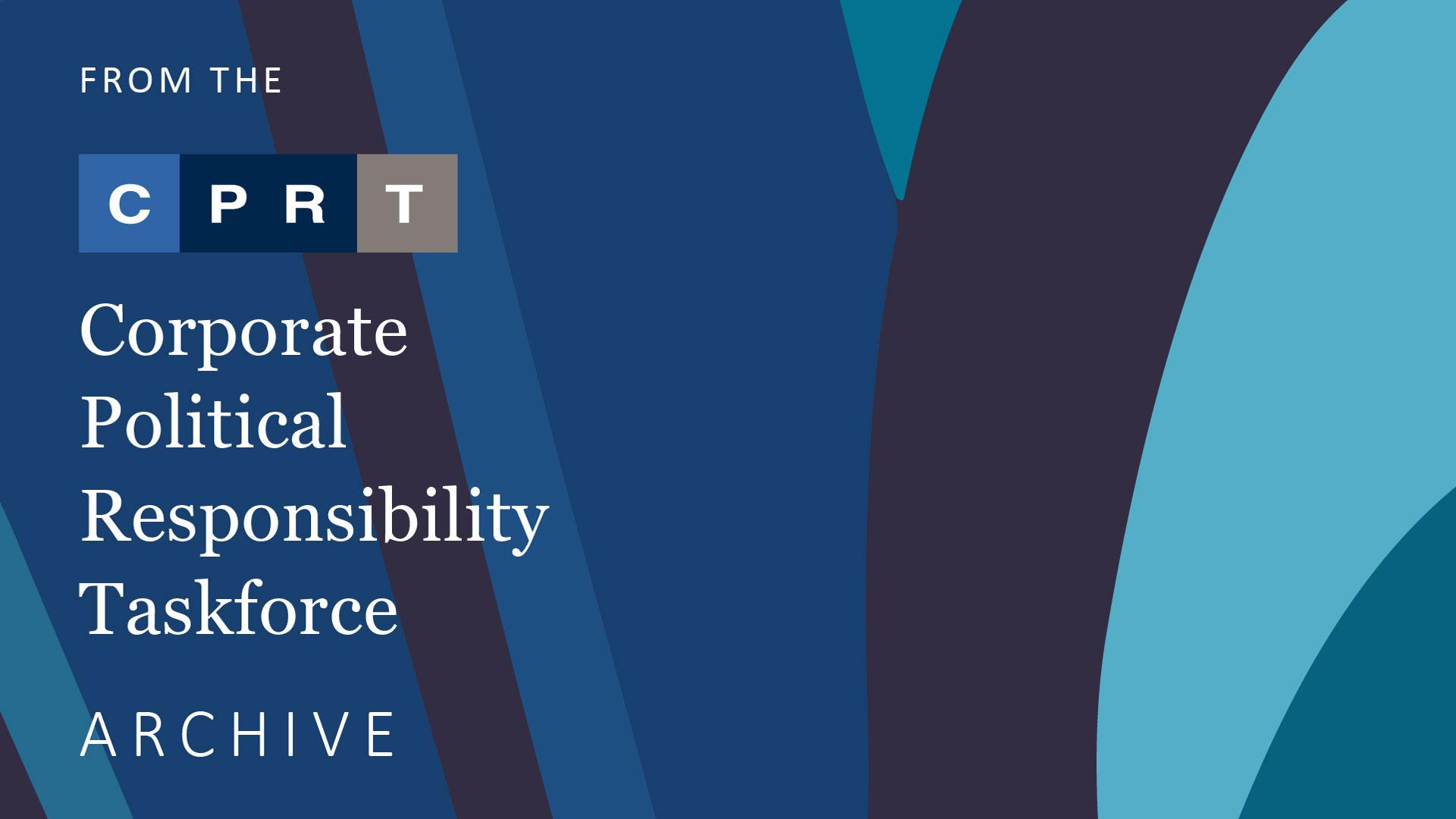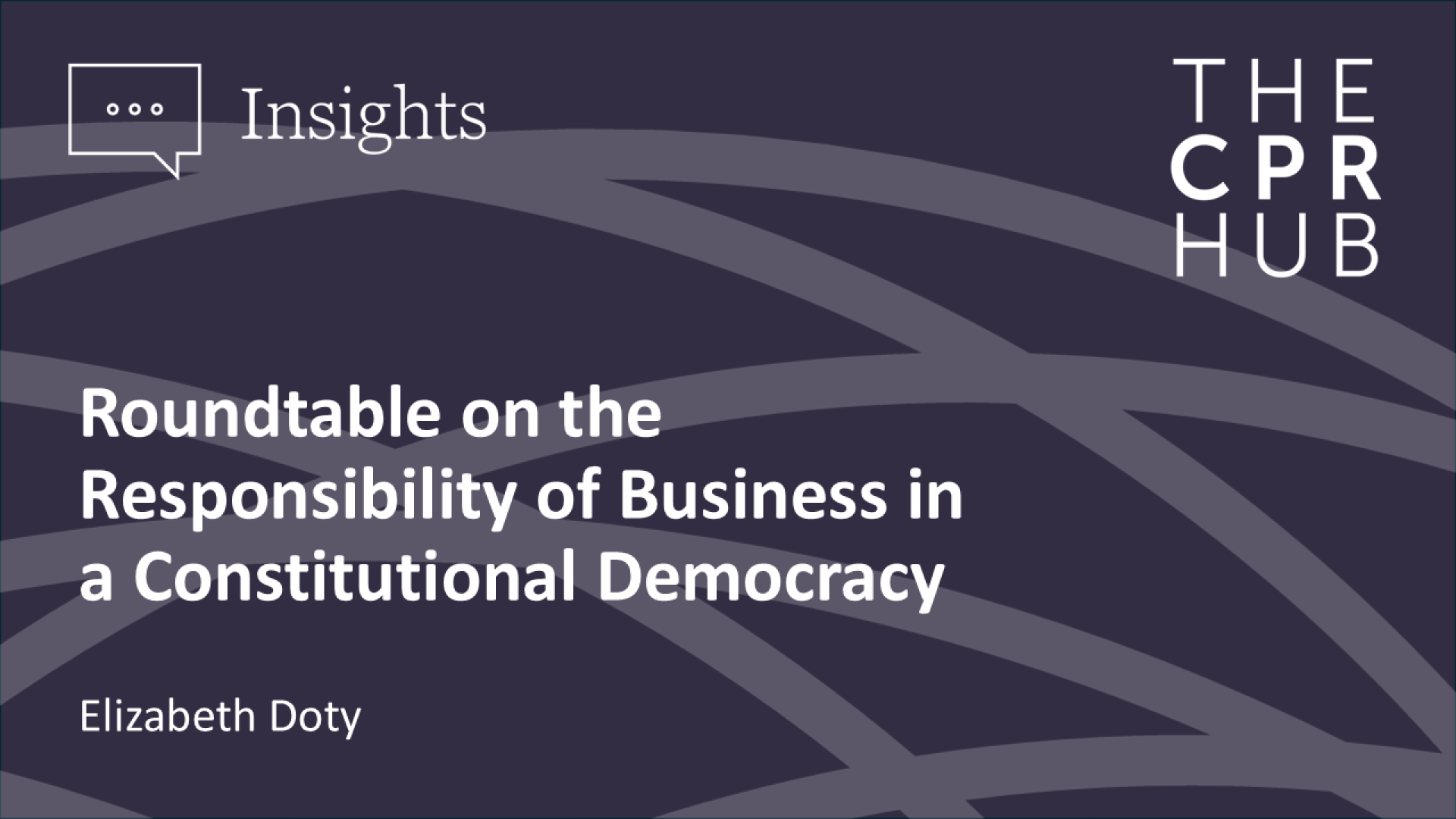Receive Updates from The CPR Hub
Learn about new tools, insights and events to help you consider how CPR can help your company, clients or members.









This article by the former President of the American Enterprise Institute explores the erosion of civic norms, institutional trust, and public-spirit in the United States, arguing that a decline in public honesty and civility is undermining free markets and trust in democratic institutions. It reflects how corporate actors operate in a context of systemic fragility and how their behaviors can either mitigate or exacerbate institutional decline. Rather than laws, he explains that it is the is the role of civic virtue which restrains advantage-taking by people who might otherwise derive special benefit from social, political, and legal systems.
This CED report outlines practical steps to strengthen public confidence in U.S. elections ahead of 2024, focusing on voter access, election administration, cybersecurity, and countering mis- and disinformation—including AI-driven threats. It highlights how businesses can serve as trusted messengers and system-supporting partners, helping reinforce institutional integrity while managing political, operational, and reputational risk.
This article argues that decarbonization policy should be rooted in pro-market principles that preserve competition, innovation, and price signals. It critiques subsidy-heavy approaches and proposes market-based mechanisms to accelerate emissions reductions while avoiding regulatory capture and distortion.
This annual survey of over 300 global businesses across 50+ countries assesses how the private sector is acting on the net-zero transition, identifying where policy, investment, and system conditions are speeding or slowing progress. It flags how geopolitical volatility and regulatory uncertainty are influencing corporate decisions and how business sees its role in system-wide transformation.
This CEO-focused briefing summarizes the Business Breakthrough Barometer’s global findings, highlighting executive insights on transition readiness, policy uncertainty, geopolitical friction, and system transformation. It distills what CEOs see as the barriers and accelerators to achieving net-zero, circularity, and nature-positive systems—and clarifies where business seeks clearer policy, capital signals, and collaborative pathways.
This analysis reports how climate change acts as a macroeconomic risk multiplier—exacerbating inflation, supply-chain stress, asset re-pricing, sovereign risk, and financial fragility. It argues that businesses and regulators must treat climate as a cross-cutting systemic issue, not simply an environmental add-on, because the economic implications span sectors, geographies and time horizons.
Convergence Compass is an online learning program for business, government, higher education and civic actors that teaches the psychology of division, dialogue strategies, and collaborative problem-solving. Developed from the Convergence Center for Policy Resolution's innovative methods, it equips participants to build trust, bridge divides, engage constructively on contentious issues, design effective processes —even when stakeholders hold strongly divergent views.
This Aspen Business & Society Summit report explores how business leaders can safeguard democracy as political risk rises. It argues that corporate silence or partisanship threatens both markets and legitimacy, urging principled, collective action and authentic corporate voice grounded in values, courage, and preparedness—core dimensions of Corporate Political Responsibility that sustain healthy civic and economic systems.
This book develops a “person-based” theory of the corporation as a social and political actor within democratic society. It examines corporate personhood, legal rights, and the firm’s obligations to democratic norms, arguing that firms have specific duties beyond their business interests, or even their interests in competitive markets.
Why this resource matters
It deepens CPR’s conceptual foundation by examining the legitimate bases (and duties) that guide corporate political influence from a principled perspective.
This CPR Decision Tool and Executive Conversation Guide is part of a suite of tools and resources that make it easier for companies to take a principled and responsible approach to a specific public affairs decision. Specifically, it is meant to help them apply the Erb Principles for CPR to weigh whether and how to engage in a specific political scenario.
This methodology outlines how the Heritage Election Integrity Scorecard evaluates state election laws across 14 criteria—such as voter roll accuracy, mail ballot security, and transparency in vote counting—to assign quantifiable scores, identify gaps, and provide model legislation. It aims to compare and improve election rules nationwide through clear, consistent, enforceable standards.
A guide to selected video clips (and some transcripts) from the Erb Institute’s Corporate Political Responsibility Taskforce (CPRT) Expert Dialogues hosted from March 2021 to April 24, featuring conversations with a diverse range of advocates, experts and executives from across the political spectrum, to explore what it means for companies to use their political influences responsibly. A very useful resource for educators, practitioners and associations to spark conversation and action. All clips are coded with keywords for easy selection by topic.
This essay explores tensions between classical-liberal and national-conservative visions of markets and the common good. Drawing on Catholic social teaching and Wilhelm Röpke’s political economy, Salter argues that free enterprise and moral order must be treated as complements, not substitutes. He calls for dispersed property, subsidiarity, and policies that support economic independence, civic virtue, and human flourishing.
Related Topics to Check Out
Free Enterprise Competitive Markets (A) – Central theme: explores how markets serve the common good when balanced by moral and civic considerations rather than pure efficiency.
Healthy, Stable Systems (A) – Advocates dispersed property and subsidiarity to sustain freedom and prevent concentration of power—key CPR system-stability goals.
Corporate Citizenship (B) – Frames enterprise as a moral actor embedded in community life, with duties to uphold shared well-being beyond profit.
Responsibility (B) – Highlights the moral obligations of firms and policymakers to design markets that sustain families, workers, and civic order.
This article presents a framework leaders can use to better focus their sustainability strategies. It consists of four lenses: the business value lens (What affects our bottom line?), the stakeholder influence lens (What are people trying to tell us?), the science and technology lens (What does the data tell us about our impact and future?), and the purpose lens (What do we stand for?). The framework is intended to help leaders balance external pressures with internal priorities and objective data with stakeholder perceptions.
The article maps out a non-partisan, principled conception of good corporate citizenship drawing on shared assumptions of the right and the left about the place of corporations in our society and the realities of corporate governance. That conception concentrates on how corporations’ own conduct affects the best interests of their stockholders, workers, communities of operation, consumers, taxpayers, and the environment.
Eccles draws on a survey of 884 sustainability experts in 72 countries, which finds that NGOs’ go-to tactics—such as boycotts, litigation, and public shaming—are seen as low-impact and risk fueling backlash. It points instead to higher-leverage strategies like policy advocacy, education, and constructive engagement with skeptics as more effective paths forward.
A Yale School of Management survey of CEOs reveals widespread private concern that Trump administration policies—from tariffs to monetary and health regulation—are harming business interests and may violate the law. Yet most executives remain publicly silent, fearing retaliation. The episode underscores corporate vulnerability to political retribution and the importance of principled, transparent corporate voice in safeguarding democratic norms and market stability.
This academic article analyzes how political polarization affects corporate nonmarket strategies—such as lobbying, advocacy, and coalition-building—across different stages of the policy life cycle. It shows how polarization changes the risks and payoffs of engagement, complicating firms’ ability to influence policy without triggering backlash or strategic misalignment.
Developed with Erb Institute’s Corporate Political Responsibility Taskforce, in consultation with academics and over 40 stakeholder groups from across the political spectrum, the Erb Principles for CPR offer a thought process for non-partisan, defensible decisions in turbulent times. The principles of legitimacy, accountability, responsibility, and transparency provide actionable and non-partisan approach to weighing when, how and why to engage in political affairs, to manage risk and advance long-term value creation for business and society.
This volume explores the promise of free markets to deliver prosperity and well-being—and the social, political, and institutional conditions required to sustain that promise. It shows why businesses have a stake in helping maintain those conditions through responsible political engagement.
Mancur Olson’s classic work explains why individuals often fail to organize effectively around shared interests, even when collective action would benefit all. His “free rider” problem and distinction between small and large groups reshape understanding of labor unions, corporations, and political coalitions. Olson’s framework underlies modern theories of governance, lobbying, and institutional design—key foundations for Corporate Political Responsibility.
This academic article revisits stakeholder theory, arguing that organizational purpose should integrate value creation across stakeholders rather than prioritize shareholder primacy alone. It refines the theoretical foundations of stakeholder governance and connects purpose to competitive advantage, institutional trust, and long-term sustainability within complex economic and civic systems.
This collection of testimonials from business leaders, academics, investors, and advocates highlights the growing recognition of corporate political responsibility (CPR) as a business imperative. The Erb Principles for CPR are endorsed as a practical, nonpartisan framework to help companies align political activity with purpose, values, and democratic institutions. Testimonials emphasize CPR's role in managing reputational risk, supporting market stability, and safeguarding democracy—making it relevant for firms across sectors and political contexts.
Learn about new tools, insights and events to help you consider how CPR can help your company, clients or members.
